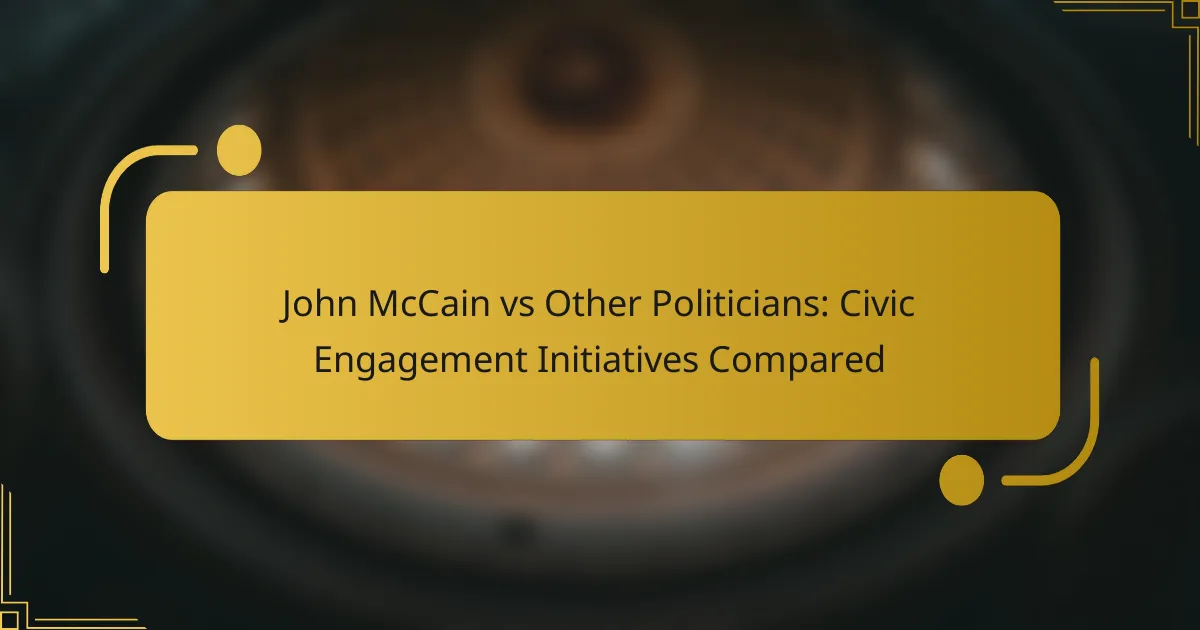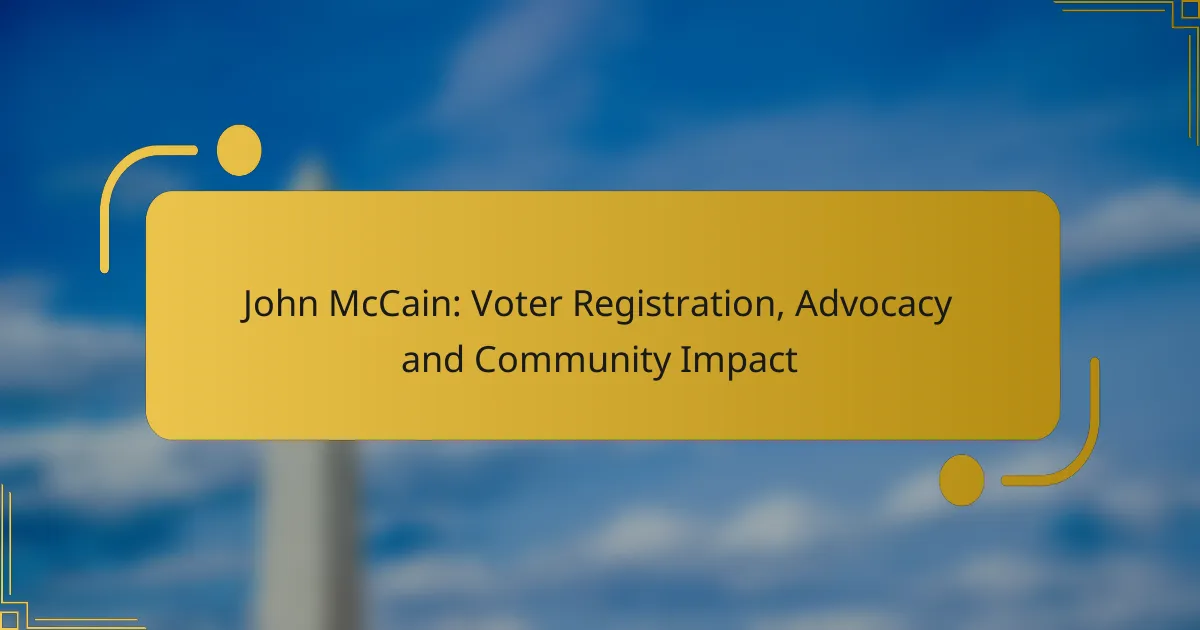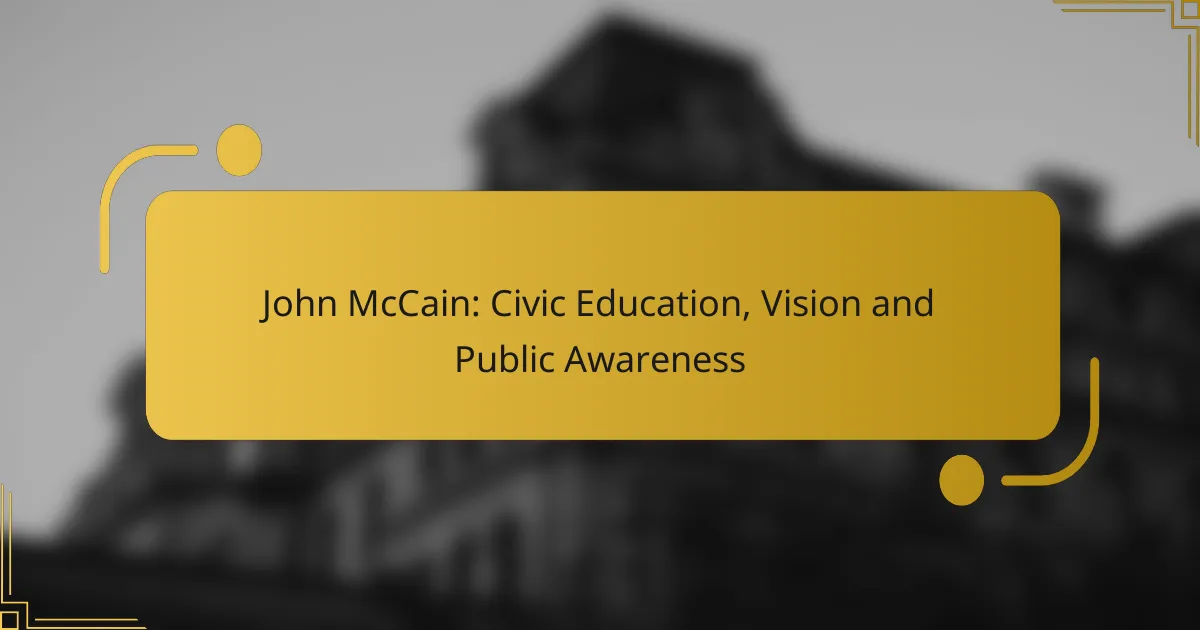John McCain’s legacy is marked by his unwavering commitment to civic action, particularly through his advocacy for veterans and promotion of bipartisanship. His principled leadership and dedication to national security have inspired countless individuals to engage in meaningful civic duties and strive for positive change within their communities. By honoring McCain’s contributions, citizens can continue to uphold his values of service, democracy, and integrity in their own lives.
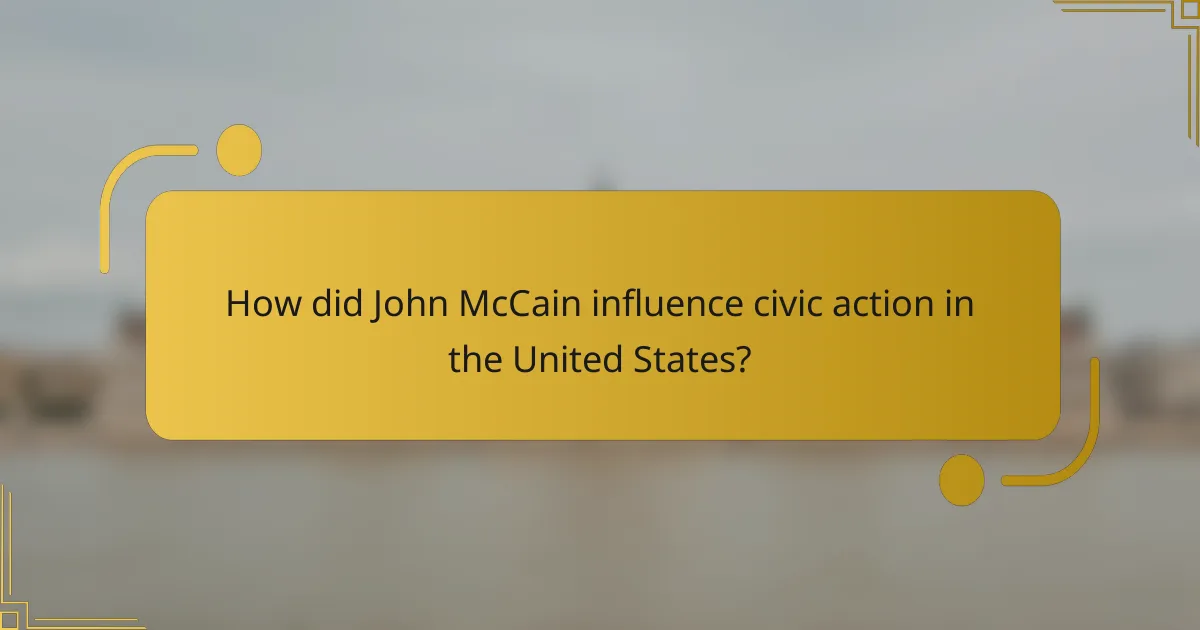
How did John McCain influence civic action in the United States?
John McCain significantly influenced civic action in the United States through his advocacy for veterans, commitment to campaign finance reform, and promotion of bipartisanship. His efforts inspired many citizens to engage in civic duties and pursue meaningful change in their communities.
Veterans’ advocacy initiatives
McCain was a staunch advocate for veterans’ rights, focusing on improving healthcare and benefits for those who served in the military. He played a key role in legislation aimed at enhancing the Veterans Affairs (VA) system, ensuring veterans received timely and quality care.
His initiatives included supporting the expansion of the GI Bill and pushing for reforms to address issues like homelessness among veterans. These efforts galvanized public support and encouraged civic organizations to take action on behalf of veterans’ needs.
Campaign finance reform efforts
McCain was a leading voice in the fight for campaign finance reform, co-sponsoring the Bipartisan Campaign Reform Act of 2002. This legislation aimed to reduce the influence of money in politics by limiting soft money contributions to political parties.
His work in this area highlighted the importance of transparency in political funding, encouraging citizens to advocate for fairer election processes. McCain’s commitment to reform inspired grassroots movements focused on ensuring that every vote counts, regardless of financial backing.
Promotion of bipartisanship
Throughout his career, McCain championed bipartisanship as a means to achieve effective governance. He believed that collaboration across party lines was essential for addressing the nation’s most pressing issues, from healthcare to national security.
His ability to work with members of both parties on key legislation, such as immigration reform and defense spending, set a precedent for future lawmakers. McCain’s legacy encourages citizens to seek common ground and engage in constructive dialogue, fostering a more unified civic environment.
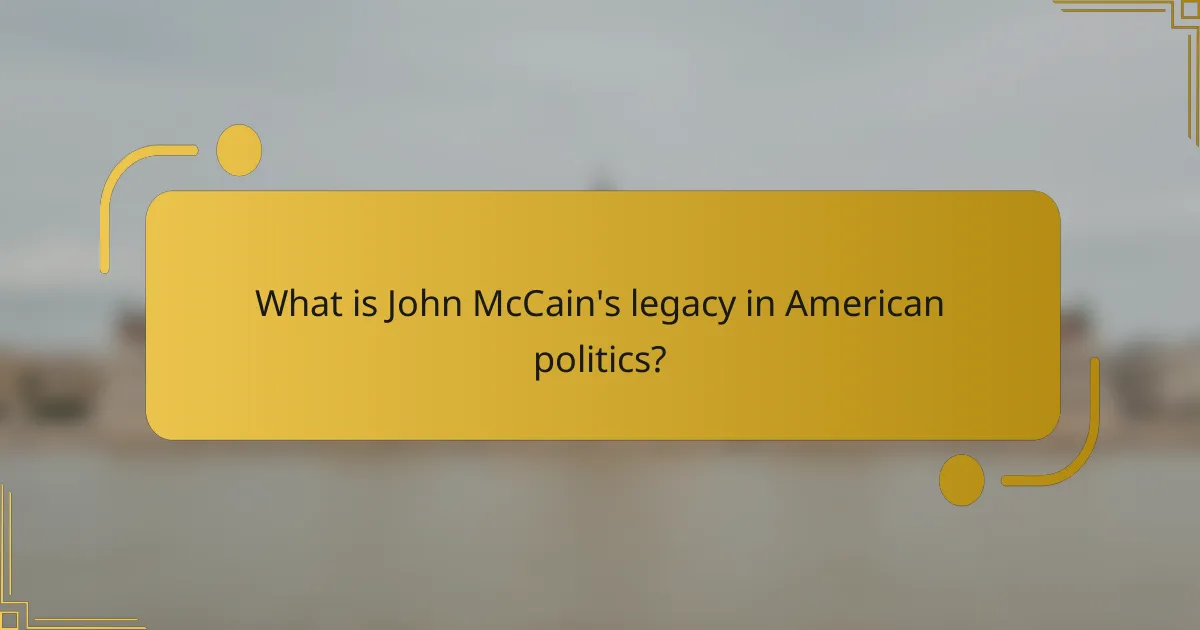
What is John McCain’s legacy in American politics?
John McCain’s legacy in American politics is characterized by his commitment to bipartisanship, principled leadership, and a strong stance on national security. His career spanned decades, during which he championed various causes that shaped the political landscape in the United States.
Impact on foreign policy
John McCain significantly influenced U.S. foreign policy, advocating for a robust military presence and interventionist strategies. He believed in promoting democracy and human rights globally, often pushing for action in regions like the Middle East and Eastern Europe.
His support for the surge in Iraq and opposition to isolationism reflected his view that American leadership was essential in maintaining global stability. McCain’s approach often emphasized the importance of alliances, particularly with NATO, and he was a vocal critic of adversarial regimes.
Role in healthcare legislation
In healthcare, McCain played a pivotal role in the debate over the Affordable Care Act (ACA). His dramatic vote against the repeal of the ACA in 2017 underscored his belief in the importance of maintaining healthcare access for millions of Americans.
McCain’s stance highlighted the complexities of healthcare reform and the need for bipartisan solutions. His actions prompted discussions on the future of healthcare legislation, emphasizing the need for collaboration across party lines to address the challenges facing the system.
Influence on Republican Party dynamics
John McCain’s influence on Republican Party dynamics was profound, particularly in promoting a more moderate and inclusive approach. He often clashed with the party’s more extreme factions, advocating for traditional conservative values while also embracing pragmatism.
His candidacy for president in 2008 and subsequent actions shaped the party’s identity, encouraging a focus on issues like immigration reform and campaign finance. McCain’s legacy continues to inspire a faction within the party that values civility and bipartisanship over divisiveness.
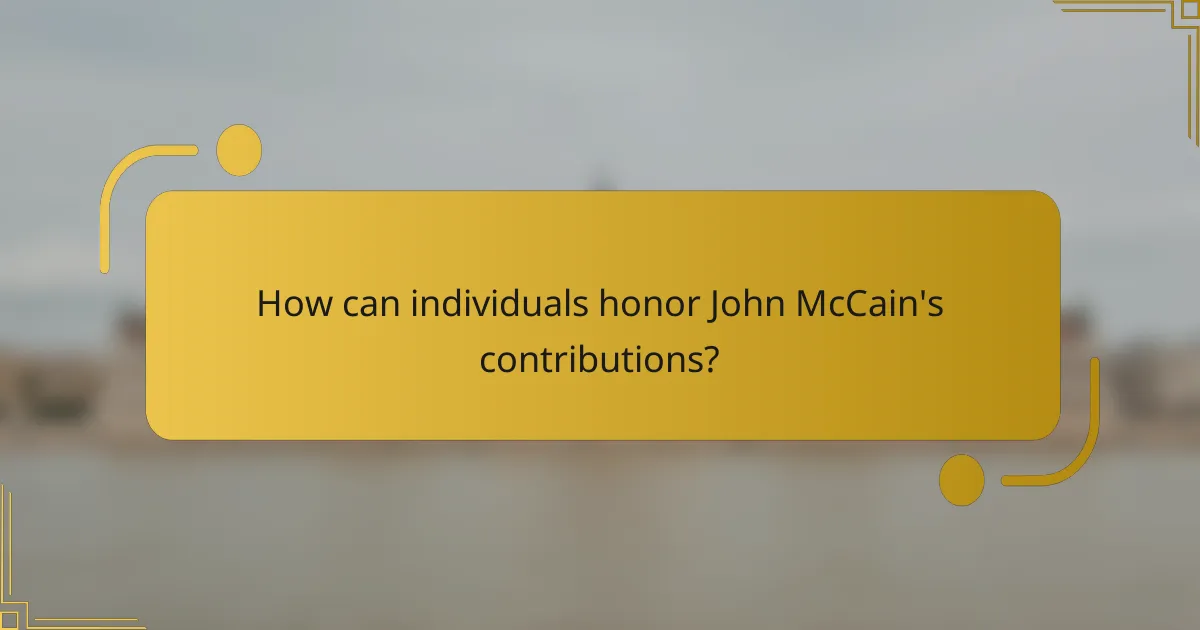
How can individuals honor John McCain’s contributions?
Individuals can honor John McCain’s contributions by actively engaging in civic activities, supporting veterans, and advocating for political integrity. Each of these actions reflects McCain’s values and commitment to service, democracy, and the nation.
Participating in civic engagement
Civic engagement involves taking part in activities that promote the common good, such as voting, attending town hall meetings, or volunteering for community projects. Individuals can honor McCain by being informed voters and participating in local governance.
Consider joining local advocacy groups or initiatives that align with your values. Engaging in discussions about policies and community needs can foster a more informed electorate and strengthen democracy.
Supporting veterans’ organizations
Supporting veterans’ organizations is a direct way to honor McCain, who was a veteran himself. Contributing to groups that provide services, resources, or advocacy for veterans can make a significant impact on their lives.
Consider donating to or volunteering with organizations like the Veterans of Foreign Wars (VFW) or the American Legion. These groups often need assistance with events, outreach, and support services, which can help bridge the gap for veterans transitioning to civilian life.
Advocating for political integrity
Advocating for political integrity means promoting transparency, accountability, and ethical behavior in government. Individuals can honor McCain’s legacy by demanding higher standards from elected officials and supporting policies that enhance democratic processes.
Engage in discussions about campaign finance reform and support candidates who prioritize integrity. Joining organizations that focus on reducing corruption and increasing voter access can amplify your voice in the political arena.
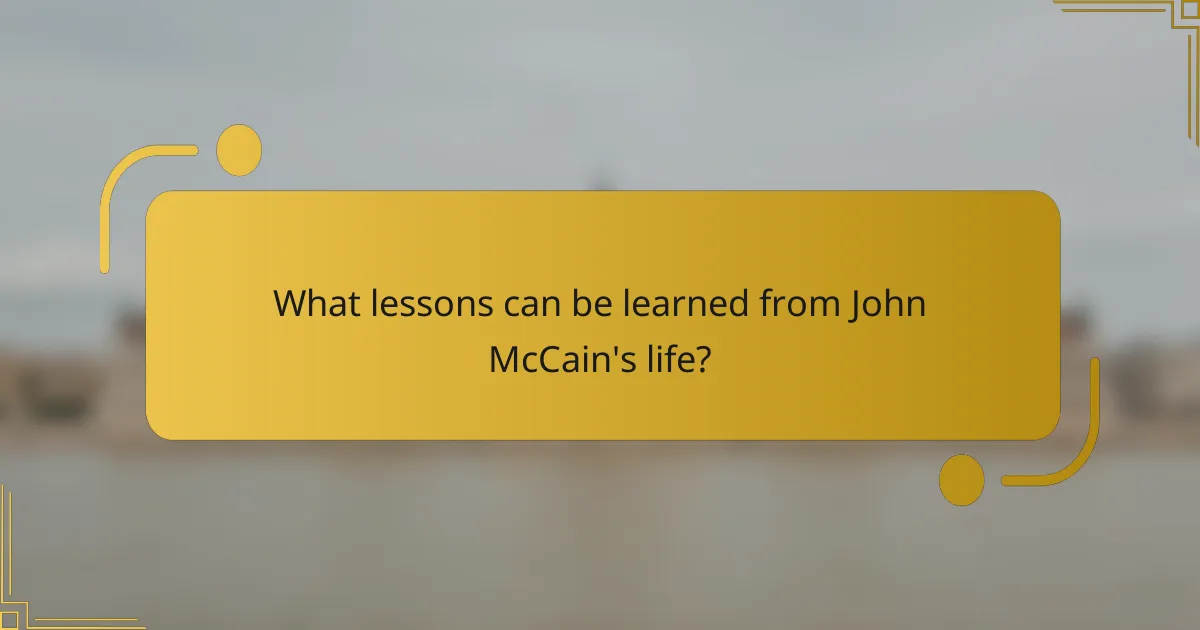
What lessons can be learned from John McCain’s life?
John McCain’s life offers valuable lessons in resilience, public service, and principled leadership. His experiences highlight the importance of perseverance in the face of challenges and the impact of dedicated civic engagement.
Resilience in adversity
John McCain’s resilience is exemplified by his time as a prisoner of war in Vietnam, where he endured years of torture and hardship. Instead of succumbing to despair, he maintained his spirit and commitment to his fellow soldiers, demonstrating that strength can emerge from the most difficult circumstances.
This resilience can inspire individuals facing personal or professional challenges. Embracing a mindset focused on overcoming obstacles, rather than being defeated by them, is crucial for achieving long-term success.
Importance of public service
McCain’s dedication to public service was evident throughout his career, from his time in the Navy to his long tenure in the U.S. Senate. He believed that serving the nation was a profound responsibility and encouraged others to engage in civic activities that contribute to the common good.
To honor his legacy, individuals can consider volunteering, participating in local governance, or advocating for causes they believe in. Engaging in public service not only benefits the community but also fosters a sense of purpose and connection.
Value of principled leadership
Principled leadership was a hallmark of McCain’s approach, characterized by integrity, honesty, and a commitment to doing what was right, even when it was politically unpopular. He often prioritized the interests of the country over party loyalty, setting an example for future leaders.
To embody principled leadership, individuals should focus on transparency, ethical decision-making, and standing firm in their values. This approach can build trust and inspire others to follow suit, creating a positive impact within organizations and communities.
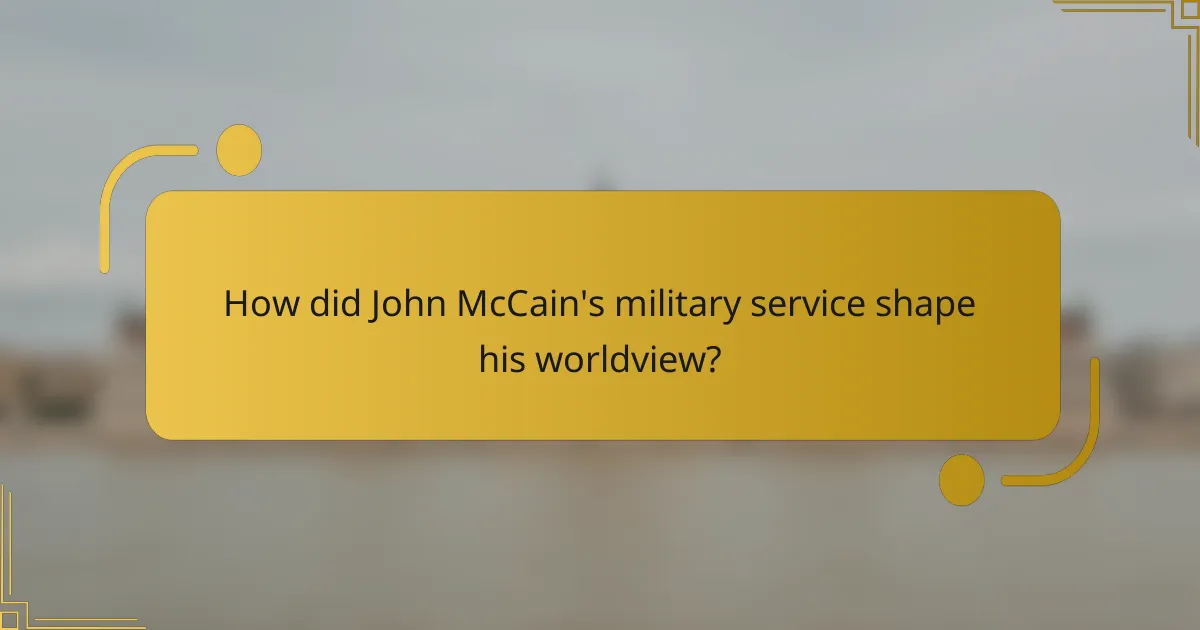
How did John McCain’s military service shape his worldview?
John McCain’s military service profoundly influenced his worldview, instilling a strong sense of duty, resilience, and commitment to the values of democracy and freedom. His experiences, particularly as a prisoner of war, shaped his perspectives on national security and military policy, emphasizing the importance of a robust defense and the moral obligations of the United States.
Experience as a POW
As a prisoner of war during the Vietnam War, John McCain endured significant physical and psychological hardships that tested his limits. His time in captivity, lasting over five years, taught him the value of perseverance and the importance of maintaining one’s principles under duress. This experience fostered a deep empathy for fellow service members and a commitment to advocating for veterans’ rights.
McCain’s resilience as a POW became a cornerstone of his identity, influencing his later political career and public service. He often spoke about the lessons learned during this time, emphasizing the need for compassion and support for those who have served in the military.
Commitment to national security
John McCain’s military background instilled in him a lifelong commitment to national security. He believed that a strong military was essential for protecting American interests and promoting global stability. This conviction drove him to support increased defense spending and modernization of the armed forces throughout his political career.
His advocacy for a proactive foreign policy reflected his belief that the U.S. should take a leading role in international affairs. McCain often argued that neglecting military readiness could lead to greater threats and instability, underscoring the need for vigilance in a changing world.
Influence on military policy
McCain’s insights from his military service significantly influenced his approach to military policy. He was a key figure in shaping legislation related to defense and veterans’ affairs, advocating for reforms that addressed the needs of service members and their families. His work on the Senate Armed Services Committee allowed him to push for policies that emphasized accountability and effectiveness in military operations.
Additionally, McCain was known for his bipartisan efforts to address issues such as military readiness and the treatment of veterans. He often collaborated with colleagues across the aisle to ensure that the military was equipped to meet contemporary challenges while honoring the sacrifices of those who served.
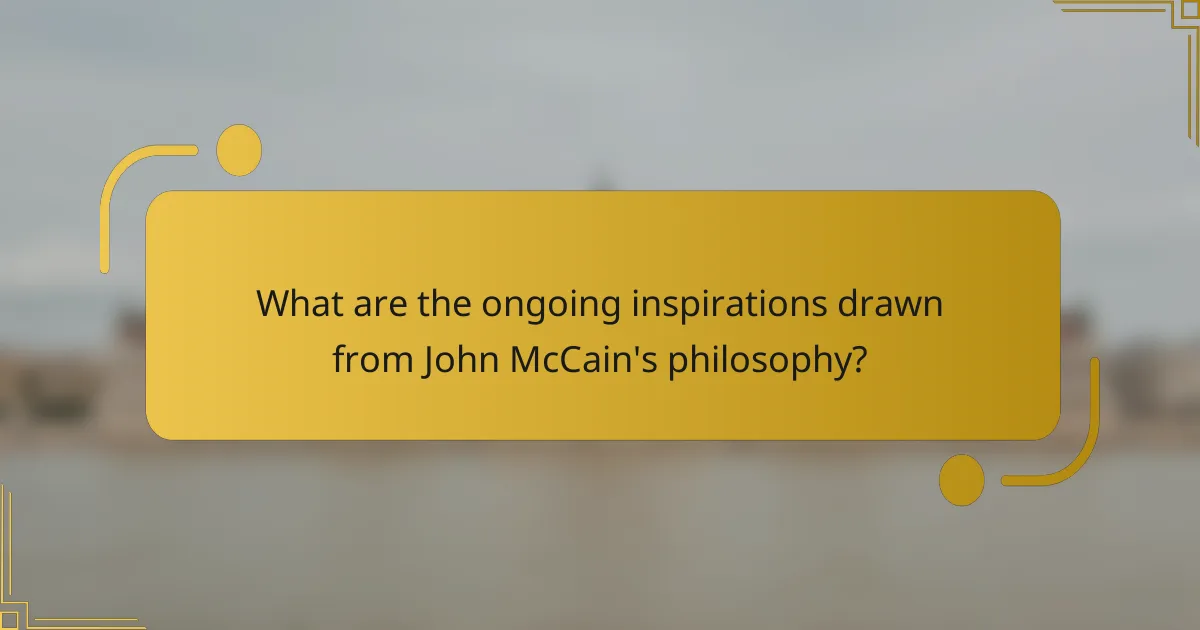
What are the ongoing inspirations drawn from John McCain’s philosophy?
John McCain’s philosophy continues to inspire individuals through his commitment to service, bipartisanship, and resilience in the face of adversity. His values encourage civic engagement and a dedication to the principles of democracy.
Commitment to Service
McCain’s lifelong dedication to public service exemplifies the importance of contributing to society. He believed that serving one’s country is a fundamental duty, inspiring many to engage in civic activities, whether through military service, volunteering, or community leadership.
To honor this commitment, individuals can seek local opportunities to serve, such as joining community boards, participating in local elections, or supporting non-profit organizations. Simple actions, like mentoring youth or organizing community clean-ups, can have a significant impact.
Bipartisanship and Collaboration
McCain championed bipartisanship, advocating for cooperation across party lines to achieve common goals. His belief in dialogue and compromise serves as a reminder that progress often requires collaboration rather than division.
To foster bipartisanship, individuals can engage in discussions with those holding differing views, attend town hall meetings, or participate in community forums. Emphasizing shared values can help bridge divides and promote constructive dialogue.
Resilience and Perseverance
McCain’s life story is a testament to resilience and the ability to overcome challenges. His experiences as a prisoner of war shaped his character and reinforced the idea that perseverance is crucial in both personal and public life.
To cultivate resilience, individuals can focus on setting realistic goals, maintaining a positive outlook, and seeking support from their communities. Learning from setbacks and viewing them as opportunities for growth can help foster a resilient mindset.

